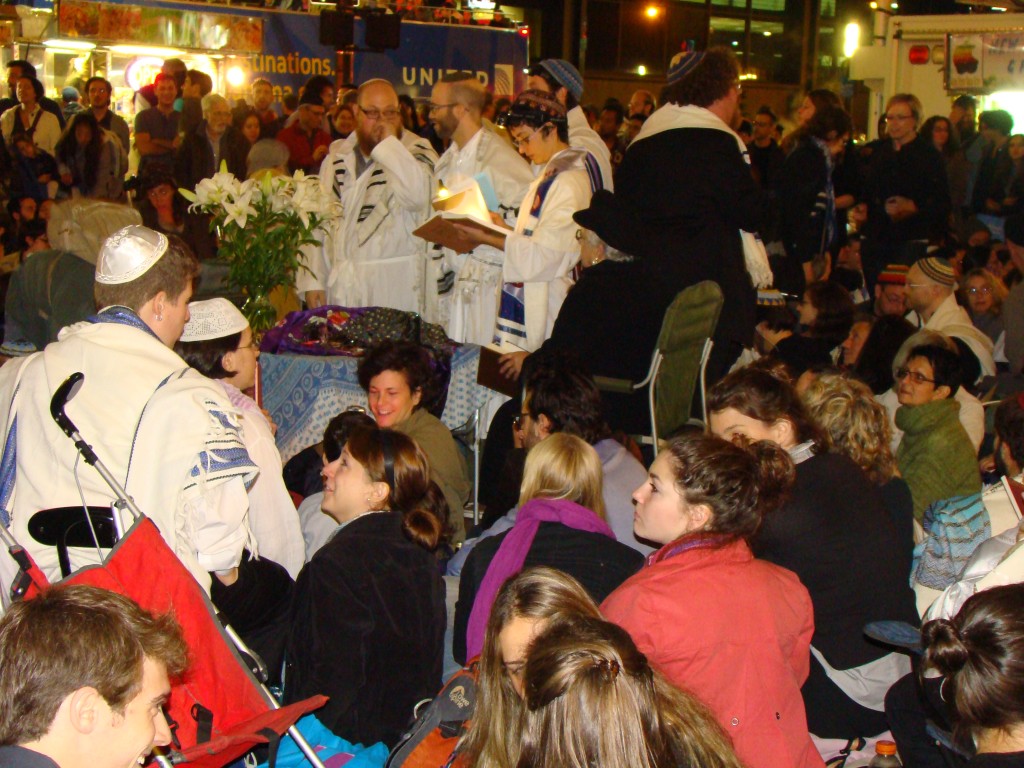The Lilith Blog 1 of 2
November 8, 2011 by Amy Stone
Occupy Judaism – More Than A Damn Good Slogan?

Photo by Amy Stone
Is Occupy Judaism no more than a great slogan, springing from the head of social media maven Daniel J. Sieradski? Or is it verbal fuel with the power to ignite a democratic free-for-all within Judaism akin to the Occupy Wall Street movement it supports?
With the end of the High Holiday activities connected to OWS across the country, what next – if anything?
So far no catchy chants or songs for Occupy Judaism (correct me if they’ve sprouted forth.) The lyrics streaming on mp3 Wall Street Main Street from Chana Rothman, deeply involved in both Occupy Philly and Occupy Judaism, are strictly secular: “Wall Street Main Street what’s it gonna be? How we gonna handle this inequality?” Born in Toronto, she sees Occupy Judaism as “so Jewish and so American. It’s kind of like Heschel marching with Martin Luther King, praying with his feet. … obligated as a Jew, as a Jewish leader to do the right things in the world.” But how does that play out?
Philadelphia visual artist Zoe Cohen says, “Just by holding these events we’re trying to push Jewish organizations to consider being part of this movement.” And if they do come on board, will the agents of change by changed?
In New York the goal, at least by some, is to bring the OWS attack on the plutocracy directly to the Jewish Establishment. Jewish rocker Naomi Less, whose program Jewish Girls Rock aims to liberate girls through doing their own rock music, says, the “Occupation concerns of economic power, inequality and privilege should resonate in our own communities. Connect the dots. What does direct democracy look like in the Jewish community? Look at our own situation, is power being abused? … For me it’s really about the social justice movement of Judaism — this is what it looks like to align your secular and religious values. … If I’m not living it, I might just as well hang up my guitar and never write another lyric again.”
In Los Angeles, Rabbi Aryeh Cohen sees Occupy Judaism as a continuation of the independent minyan movement of the last 10 years with its “unabashed self-identification as religious and that’s a language to speak about justice.” Cohen, Associate Professor of Rabbinic Literature at American Jewish University and author of Justice in the City: Toward a Community of Obligation (New Perspectives in Post-Rabbinic Judaism), says, “This is not about Occupy the Jewish Federation or Jewish Agency. The idea of the whole independent movement outside institutional Judaism has empowered lots of people. … The folks who are doing the Occupy Judaism events like the Kol Nidre in New York and our Just Sukkah here in LA don’t feel the need for mainstream institutions to authorize what they are doing.”
Back in the ‘60s, Jews were deeply active in the Anti-Vietnam War Movement but not as Jews. And back in the ‘70s, young Jews were occupying a few key Jewish federation offices with demands for change. But in 2011, the Jewish establishment is no longer the citadel to be stormed, unless perhaps the issue is Palestinian Statehood.
Like Occupy Wall Street’s open democracy with multiple messages, Occupy Judaism still seems in the stage of welcoming all input in bringing Jewish values to the support of the Occupation. And at this point, the joy seems to stem from being Jewishly identified on our own terms, taking on the financial establishment, not the Jewish establishment.
 Please wait...
Please wait...